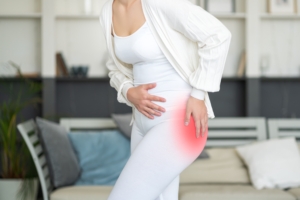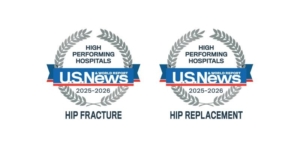Holy Cross Orthopedic Institute
The Impact of Arthritis and Obesity on Hip or Knee Replacement Surgery
May was officially Arthritis Awareness Month, but any time is a good time to discuss the cause-and-effect relationships among arthritis, obesity and total hip or knee replacement surgery.
Osteoarthritis is the most common reason people undergo hip or knee replacement. This condition leads to the destruction of specialized cartilage that lines our joints and gets worse over time. Folks who develop osteoarthritis of their hip or knee typically complain of pain in the joint and swelling. Many folks develop a limp and joint motion becomes more restricted. They complain that it is more difficult staying active and find themselves saying “no” to more activities that they once enjoyed. As the arthritis progresses, everyday activities of daily living become more challenging, such as putting on socks, getting up from a chair or climbing up or down stairs. Excessive body weight puts extra stress and pressure on the hip or knee joints, making activities even more difficult and often hastening the joint’s demise.
What’s causing the pain? Where is the pain coming from?
As the hyaline cartilage that covers the ends of our bones wears away, nerves ending in bone become exposed and irritated as the bones rub together causing pain. As our joint becomes inflamed, the lining of our joint secretes more fluid resulting in swelling which distend the joint capsule and causes pain.
Sometimes pain that seems to be coming from a hip or knee joint is actually being emitted or “referred” from another source.
Osteoarthritis of the hip classically presents with groin pain that radiates down the front upper thigh towards the knee. Some folks who develop hip arthritis don’t have any groin pain, but rather feel discomfort on the side or in the back of their hip while others only in their knee. It is important and often difficult to distinguish pain that is being caused by an arthritic hip from pain that is originating from a lower back problem or another source.
Knee osteoarthritis also usually presents with pain in the knee joint when walking or weight bearing. The location of the knee pain is often a clue as to where the arthritis in the knee is developing. As the osteoarthritic process progresses, the leg may no longer look straight but appear to be knock-kneed or bowlegged. Some people with knee osteoarthritis experience pain that radiates up the thigh or down the lower leg. Many folks complain that their knee swells, locks or gives way when they stand or walk. Knee pain, like hip pain, can also be referred from another area, such as an arthritic back. It is very important that the underlying etiology of the pain is understood.
The diagnosis of hip or knee arthritis is made from one’s history, a thorough physical exam and X-rays. X-rays of an osteoarthritic hip or knee classically show a narrowing or complete loss of the normal joint space between the bones that make up our hip joint or knee joint. This normal joint space is created by hyaline cartilage whose job it is to relieve friction, distribute forces, and prevent these bones from rubbing together. X-rays of arthritic hip or knee joints often show bone spurs, bone thickening and bone cysts. Occasionally an MRI is obtained to visualize further details in the bone, cartilage and soft tissues or when the diagnosis is still not clear from X-rays.
The impact of obesity
Overweight or obese people are more likely than slender people to need a total hip and/or knee replacement and may take longer to heal, recover and resume an active lifestyle after surgery. Folks who are overweight also have a higher incidence than people who are not overweight of developing a complication after surgery, including wound problems and infection.
While it may seem paradoxical, many individuals who are significantly overweight are actually malnourished, lacking essential micronutrients which can profoundly compromise their healing potential and their ability to fight infection.
It is technically more difficult and requires more time to perform a hip or knee replacement in someone who is overweight. Most of my patients after a hip or knee replacement go home the afternoon of their surgery. If someone is significantly overweight, they are more likely to remain in the hospital after their surgery. Other conditions including hypertension, heart disease, stroke and diabetes are also more common in individuals who are significantly overweight. Alarmingly, all of these conditions are associated with a higher incidence of co-morbidities and mortalities.
The more weight you carry around, the more stress you put on your hips and knees. That concept may be easy to understand, but it’s often not easy for people who struggle with their weight to lose weight, especially when they have become even less active due to their hip or knee arthritis. While exercise is important, studies have shown that diet, both what you eat and how much you eat, is even more important when trying to lose weight. I’ve cared for many patients over the years who were able to lose weight and reduce the pressure on their arthritic hip or knee so significantly that they were able to delay their need for joint replacement.
On a positive note, despite the increased forces a hip or knee prosthesis may be subjected to in someone who is overweight, studies have shown that stable, well-functioning hip and knee replacements in obese individuals can last as long as in individuals who are thinner. This is partially because obese individuals often are not as active as folks who are thinner.
The power of a healthy diet
Losing weight for most is the hard part. Often enlisting help from your physician or a nutritionist who analyses your current eating habits, recommends concrete changes, and then monitors how you are doing, is effective. Some people have found success with organizations such as Weight Watchers or other programs which supply nutritionally balanced meals or recipes. Occasionally, surgical options are appropriate. Recently, new and even old classes of drugs are gaining popularity for their positive effect in helping individuals lose weight.
No matter which weight-loss regimen you choose, a smart approach to weight loss begins with eating a healthy, balanced diet. If you need a total hip or knee replacement, good nutrition is essential to protecting your joints, regaining your strength after surgery and healing as quickly as possible. Rather than going on a crash diet which is bound to fail, begin by eating smaller portions, making fruits and vegetables the centerpiece of your meal along with lean proteins, such as chicken and fish, and avoiding sweets and fatty foods that may contribute to inflammation and developing osteoarthritis. Learn to love salmon and walnuts for the anti-inflammatory properties of their omega3 fatty acids. Enjoy leafy green vegetables for their magnesium, which relieves pain and relaxes muscles. Some studies have demonstrated that taking a glucosamine and chondroitin supplement can help protect, build and repair cartilage. In short, say no to foods that will cause you to gain weight and yes to those which make you the best, healthiest and most resilient version of yourself.
Drinking an adequate amount of fluids is also important to prevent or delay the need for a hip or knee replacement and then to help you recover after surgery. Water and other non-carbonated, sugar-free beverages are best. Avoid alcoholic drinks and keep caffeinated beverages like coffee to a minimum.
If you are dealing with the pain of osteoarthritis and facing joint replacement surgery, remind yourself that eating a healthy diet is not some sort of deprivation. Rather, it is a positive investment in your lifestyle and well-being that will pay dividends for years to come, beginning with pain-free, optimal results from your hip or knee replacement surgery.
About Dr. William Leone and The Leone Center for Orthopedic Care at Holy Cross Health
William A. Leone, MD, FACS, one of the nation’s top orthopedic surgeons, has operated on thousands of people from all over the world with hip and knee conditions. He takes pride in solving even the most complex hip and knee problems and is gratified by the profoundly positive effect the surgeries he has performed have had on the lives of so many patients.
The Leone Center for Orthopedic Care at Holy Cross Health is located at 1000 NE 56th Street in Fort Lauderdale. For more information or to schedule a consultation, please call 954-489-4575 or visit holycrossleonecenter.com.





